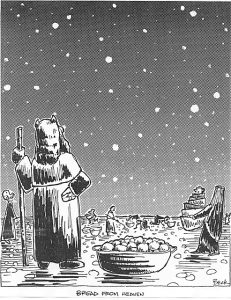You gave them bread from heaven
August 5, 2018
EIGHTEENTH SUNDAY IN ORDINARY TIME
Ex 16:2-4, 12-15
Manna and Quail in the desert
Ps 78:3-4, 23-25, 54
You gave them bread from heaven
Eph 4:17-20-24
Put away the old self
Jn 6:24-35
The quest for the true bread
http://www.usccb.org/bible/readings/ 080518.cfm
 The multiplication of the loaves and fishes has occurred, and the Bread of Life discourse is yet to begin. Jesus has left the area for Capernaum, but the crowds followed him there.
The multiplication of the loaves and fishes has occurred, and the Bread of Life discourse is yet to begin. Jesus has left the area for Capernaum, but the crowds followed him there.
An initial exchange between Jesus and voices in the crowd prompt him to claim that they are more interested in the food than the meaning — the sign — of the event. In response, they request a sign, that they may believe. They cite the precedent of Moses: “Our ancestors ate manna in the desert, as it is written: He gave them bread from heaven to eat.” Jesus points out that it was not Moses, but God who provided the bread, but his Father, who “gives you the true bread from heaven.”
Moses and the manna loom behind the entire chapter of John’s discourse on the Break of Life. But it is only this Sunday that it makes an appearance in the Old Testament reading, since there are other aspects that will need attention, to be introduced on other Sundays. So let us take a look at the Moses story.
In Exodus 16, the Israelites have just escaped Egypt as a group of runaway slaves. But now they are out on their own, among the unforgiving elements of the wilderness, their excitement has cooled. They are unprepared for this environment, and long for the security and “fleshpots” of the Egyptian kitchens.
The tension between security — albeit with slavery — against freedom with its risks, is highlighted in the story. This is, if you will, its theme. Freedom has its costs. They have followed their God out into the uncertainty of nowhere, a place where no one lives and no one should. And Moses has his hands full dealing with them.
But the Lord provides. Quail in the evening, and some bread-like substance that they call “manna” in the morning. There are a number of theories as to what this “manna” is. A general consensus is that it is “a honeydew excretion produced by two species of scale insect that infest the tamarisk thickets of the area” (from the Jerome Biblical Commentary). (If this sounds unappetizing, think about eating honey, also from insects.)
The Israelites are learning to trust in God. This prepares them for the events on Sinai, a few chapters away, at which time they enter into a covenant with God whom they have finally learned to trust.
There is a backstory to this story as well, if we remember that the Books of Moses in the Bible were assembled and in many cases written many years later, when the Judeans were in exile in Babylon. There they were gathering their traditions and history in the face of a possible end to it all. But when they had a chance to return, many were loathe to do so. As John McDermott points out (Reading the Pentateuch), “Given the chance to return to Judah after Cyrus conquered Babylon, most chose not to — why leave behind the predictable lives they had established in Babylon, even if it was in exile from their homeland, and start over again in an uncertain Judah?” The story is a metaphor for the risks facing the returning exiles.
In John’s Gospel, the Moses story be-comes a metaphor for the mission of Jesus. The hesitancy to follow him involves risks, and those invited are uncertain. Similar to the Israelites in the desert, and the Judeans in exile, they are weighing the risks of freedom with the costs of the security of the familiar. Hence the insistent questions — “What sign can you do, that we may see and believe in you? What can you do?” Make it safe for us, and we will follow you.
For reflection: What are the costs of discipleship?
Father Beck is professor emeritus of religious studies at Loras College, Dubuque.




